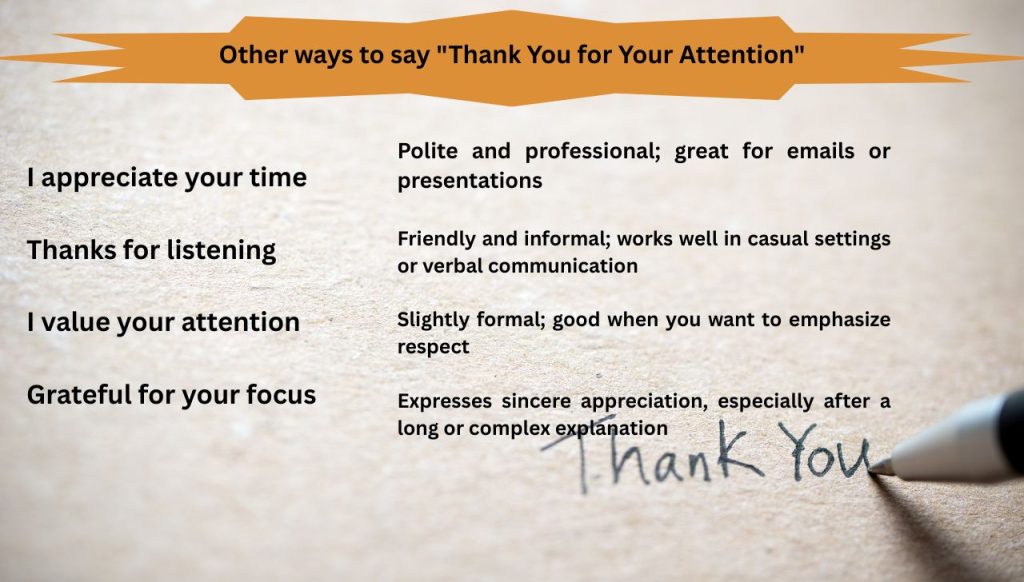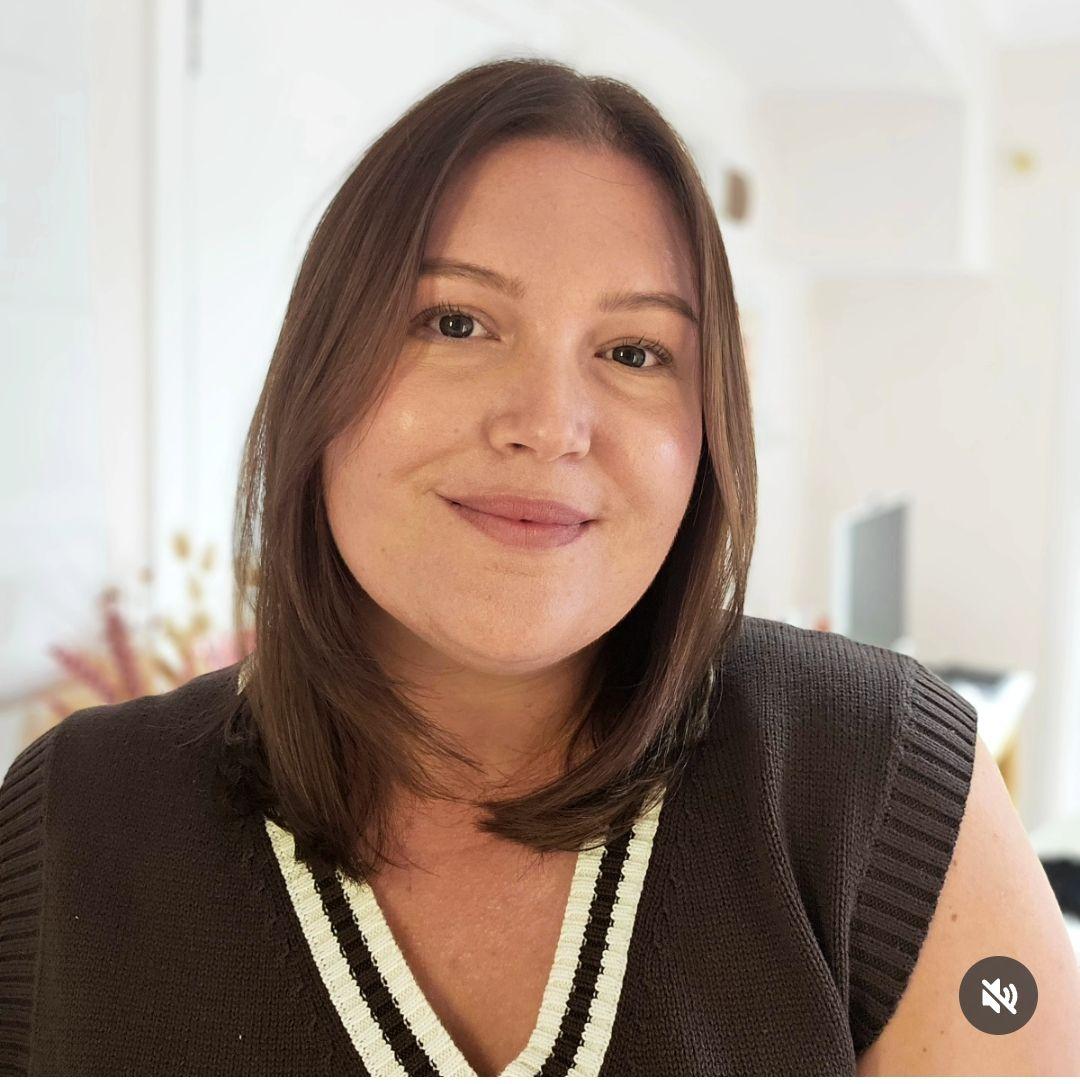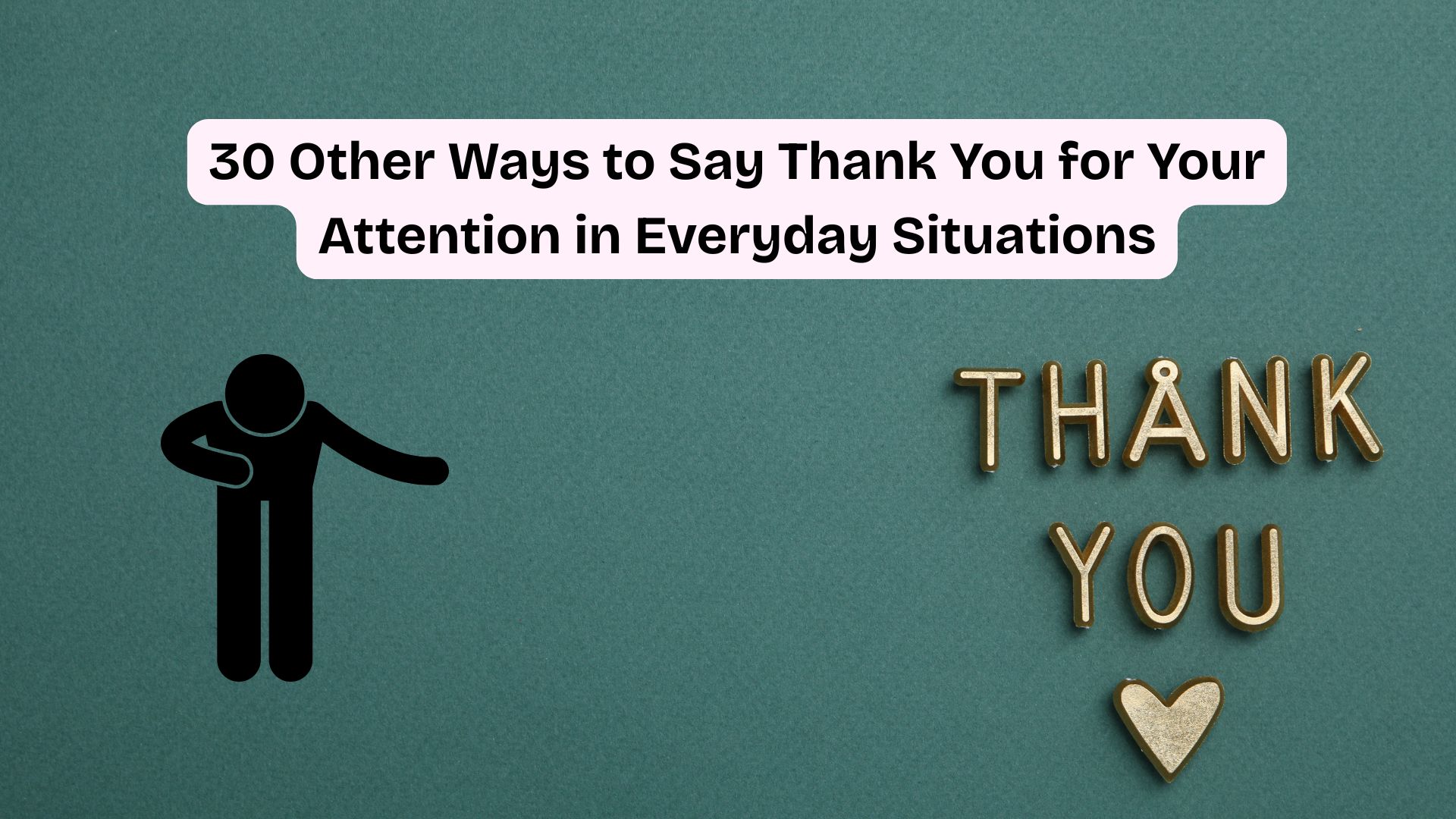“Thank you for your attention” can sound stiff, especially outside a meeting room or formal setting. But showing appreciation? That’s always in style. Whether you’re wrapping up a chat, finishing a story, or just grateful someone listened (hey, it happens), having a few fresh ways to say it can make all the difference. From casual quips to polite nods, language lets us express gratitude with a little more color and character. So, if you’re ready to skip the robotic replies and sound more human.
“Thank You for Your Attention” Meaning
“Thank you for your attention” is a polite way to end a talk, email, or presentation. It shows appreciation for the listener’s time and focus—especially when they could’ve been distracted or busy with something else. It’s commonly used in formal business meetings, lectures, or public speaking.
For example, after presenting a new marketing strategy to your team, you might close with: “That concludes the overview. Thank you for your attention.” It wraps things up respectfully and lets people know you value their engagement.
When to use “Thank You for Your Attention”
“Thank you for your attention” is typically used in formal settings—think presentations, speeches, or professional reports. It’s a polite way to close things out and acknowledge that your audience has (hopefully) been engaged. You’ll often hear it at the end of a slide deck or a keynote address, where the speaker is wrapping up and wants to show appreciation before moving into a Q&A or concluding remarks.
In writing, it appears in emails, reports, or formal documents—especially when you’re sharing detailed information or asking someone to focus on your message. For instance, if you’re sending a proposal or analysis, ending with “Thank you for your attention” adds a courteous touch and signals that you’ve said all you need to. It fits well when the tone is professional and the message required the reader to stay focused.
Why to say “Thank You for Your Attention”
Saying “Thank you for your attention” is a respectful way to show appreciation when someone has taken the time to listen, read, or focus on what you’re sharing. It’s beneficial at the end of presentations, speeches, or detailed explanations—any situation where people are expected to concentrate for a while. For example, after explaining a business proposal in a meeting, you might say, “That covers our plan for the next quarter. Thank you for your attention,” as a polite way to close and acknowledge their focus.
It also works well in written communication, like reports or formal emails, where you’re delivering important or dense information. For instance, in a project update email, ending with “Thank you for your attention to these details” can reinforce professionalism while also recognizing the reader’s time. It helps wrap things up neatly and leaves a courteous impression, especially when you’re hoping for feedback or next steps.

Other ways to say “Thank You for Your Attention”
| Alternative Phrase | Meaning / When to Use |
|---|---|
| I appreciate your time | Polite and professional; great for emails or presentations |
| Thanks for listening | Friendly and informal; works well in casual settings or verbal communication |
| I value your attention | Slightly formal; good when you want to emphasize respect |
| Grateful for your focus | Expresses sincere appreciation, especially after a long or complex explanation |
| Thanks for sticking with me | Informal and relatable; use when something was lengthy or technical |
| Appreciate your interest | Ideal when the topic was voluntary or optional |
| Thanks for bearing with me | Casual and slightly humorous; great when things didn’t go perfectly |
| Thanks for your patience | Respectful; especially useful if there were delays or interruptions |
| Many thanks for your attention | Formal and polite; common in academic or professional contexts |
| I’m grateful for your engagement | Formal; use when the audience interacted or participated actively |
| Thanks for tuning in | Informal; often used for webinars, podcasts, or virtual meetings |
| Your attention means a lot | Warm and sincere; builds emotional connection |
| Thank you for being here | Welcoming and inclusive; use when acknowledging presence is important |
| Appreciate your support | Slightly broader than just attention—acknowledges ongoing involvement |
| Thanks for showing up | Casual and lighthearted; fits well with familiar audiences |
| Thank you for your kind attention | Formal and elegant; often used in written speeches or letters |
| Much appreciated | Short and flexible; fits most situations, especially written communication |
| Thanks for the eye-time | Slangy and playful; only use in relaxed, informal settings |
| I truly appreciate your focus | Emphasizes sincerity; appropriate in emotional or intense presentations |
| Thanks for hanging in there | Informal and empathetic; shows you recognize the listener’s patience |
| Thank you for taking the time | Common and courteous; perfect for business emails or formal settings |
| I’m thankful for your presence | Slightly spiritual or emotional; works in intimate or reflective settings |
| Appreciate your attention to this | Businesslike and respectful; great in proposals or reports |
| Your interest is appreciated | Neutral and professional; safe for any audience |
| Thanks for your ears | Playful and informal; suits relaxed talks or storytelling |
| Much obliged | Slightly old-fashioned but charming; great for stylistic variety |
| I’m honored you took the time | Very sincere and humble; ideal when addressing senior or respected individuals |
| Thank you for the courtesy of your attention | Formal and polished; great for presentations or formal letters |
| Thanks a ton for tuning in | Informal and energetic; great closer for podcasts, vlogs, or upbeat presentations |
| Really appreciate you paying attention | Conversational and real; shows human gratitude without being too stiff |
Conclusion
Oops, scratch that—variety does matter when it comes to expressing appreciation. Swapping out the usual “Thanks for your attention” for something more heartfelt or conversational can leave a stronger impression. It’s not just about the words; it’s how they land. So next time someone lends you their ear, try mixing it up. Gratitude, after all, deserves a little personality.

Grammar Nerd, ESL Trainer, Low-Key Comma Crusader
Daniel has taught English for over a decade, from small community classes in Oaxaca to bustling university halls in London. He has a knack for turning even the driest grammar points into relatable, real-life language tools—think fewer red pens, more real talk. He co-founded Grammation to make grammar less gatekeeper-y and more global. When he’s not decoding sentence structures, he’s probably hiking with a paperback novel or adding unnecessary hyphens for fun.
“The rules of grammar should empower people—not trip them up.”


